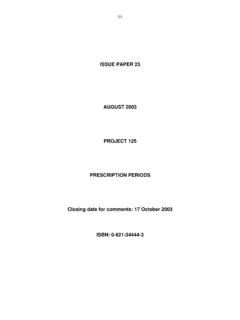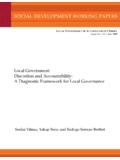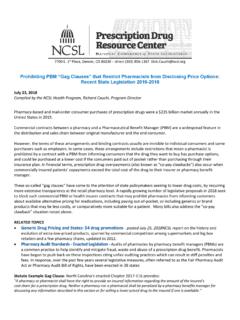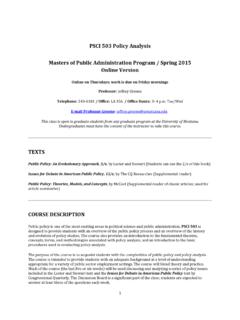Transcription of DISCUSSION PAPER 126 PROJECT 125 …
1 DISCUSSION PAPER 126 PROJECT 125 PRESCRIPTION PERIODS JULY 2011 CLOSING DATE FOR COMMENT: 30 SEPTEMBER 2011 ISBN: 978-0-621-40078-6 i ii Introduction The South African Law Reform Commission (SALRC) was established by the South African Law Reform Commission Act, 1973 (Act 19 of 1973). The members of the SALRC are The Honourable Madam Justice Yvonne Mokgoro (Chairperson) The Honourable Mr Justice Willie Seriti (Vice Chairperson) Professor Cathi Albertyn The Honourable Mr Justice Dennis Davis Mr Tembeka Ngcukaitobi Advocate Dumisa Ntsebeza SC Professor PJ Schwikkard Advocate Mahlape Sello The Secretary of the SALRC is Mr Michael Palumbo.
2 The PROJECT leader appointed for this investigation is Adv Mahlape Sello. The researcher who was assigned to this investigation was Adv Tshepang Monare who has since assumed duty at the Legal Aid South Africa. Correspondence should be addressed to: The Secretary South African Law Reform Commission Private Bag X668 Pretoria 0001 Telephone: (012) 392-9540 Fax: (012) 323 4406 E-mail: Website: iii Preface This DISCUSSION PAPER , which reflects information accumulated at the end of December 2010, has been prepared to elicit responses from parties and to serve as a basis for the SALRC s deliberations.
3 Following an evaluation of the responses and any final deliberations on the matter, the SALRC may issue a report on this subject which will be submitted to the Minister of Justice and Constitutional Development for tabling in Parliament. The views, conclusions and recommendations in this PAPER are not the SALRC s final views. The PAPER is published in full so as to provide persons and bodies wishing to comment or to make suggestions for the reform of this particular area of the law with sufficient background information to enable them to place focussed submissions before the SALRC.
4 The SALRC will assume that respondents agree to the SALRC quoting from or referring to comments and attributing comments to respondents, unless representations are marked confidential. Respondents should be aware that the SALRC may in any event be required to release information contained in representations under the Promotion of Access to Information Act 2 of 2000. Respondents are requested to submit written comments and representations to the SALRC by 30 September 2011 at the address appearing on the previous page. Comment can be sent by e-mail or by post. This document is available on the Internet at.
5 Iv Summary of Recommendations Poverty, illiteracy and the differences of language and culture are peculiar characteristics of the South African society. Most people who sustain compensable injuries or otherwise entitled to financial compensation for injury are either unaware of, or poorly informed about their legal rights and what they should do in order to enforce those. Adding to the particular vulnerability of many are the difficulties of securing legal and professional assistance. In short, legal service is a scarce resource in South Although the objective of having prescription periods is to create legal certainty, such an objective needs to be measured against the background of the circumstances that prevail in our society as mentioned above.
6 The Constitution protects the right to equality and access to courts. There is manifest unfairness in according public institutions special protections, which are not extended to private persons with claims against the state. This may imply an absence of equal protection and benefit of the law. Some prescription periods contained in statutes create inequalities between people with civil claims against public institutions and those against other defendants. Claims against public institutions are subject to stringent conditions contained in legislation.
7 The difference - which results in the inequality - arises from the different treatment between potential defendants also manifests in another area. Public institutions with claims against individuals are not subject to any statutorily prescribed limitations. By not affording the plaintiff with condonation for failure to institute a claim within the prescribed period, claimants with genuine claims may not have the opportunity to institute their cases even where there is a just cause for not instituting such a claim on time. The SALRC s investigation has revealed the following options for reform: (a) Different prescription periods as provided in section 11 be retained.
8 1 Permanent Secretary, Department of Welfare, Eastern Cape, and Another v Ngxuza and Others 2001 (4) SA 1184 (SCA) at 1190. v (b) That the prescription period set out in section 11(d) of the Prescription Act 68 of 1969 be extended from three to five years from the period the creditor has knowledge of the debt or could have taken necessary steps to acquire such knowledge. (c) That the notice requirement of the intention to institute legal proceedings against organs of state before issuing of summons be abolished.
9 (d) That courts should be granted the power to condone, on good cause shown, the late institution of a claim, where the debt has prescribed in terms of section 11(d) of the Prescription Act. A court considering whether or not to grant condonation should consider the following factors: (i) the nature of the relief sought; (ii) the extent and cause of the delay; (iii) the effect of the delay on the administration of justice and other litigants; (iv) the prospects of success of the case; and (v) on good cause shown. (e) That the prescription period in section 44 of the Compensation for Occupational Injuries and Diseases Act 130 of 1993 be repealed.
10 (f) That section 23 of the Road Accident Fund Act 56 of 1996 should be amended and that prescription should start to run from the date on which the accident occurred unless the creditor has knowledge of the facts from which the accident arises: Provided that a creditor shall be deemed to have such knowledge if s/he could have acquired it by reasonable care. (g) That damages claims which arises from offences listed in section 18 of the Criminal Procedure Act 51 of 1977 should be suspended until the criminal trial is concluded. vi TABLE OF CONTENTS Introduction ii Preface iii Summary of recommendations iv Table of Contents vi CHAPTER 1: INTRODUCTION 1 A.


















